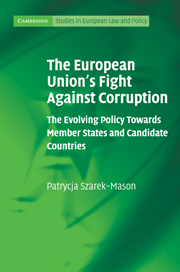 The European Union's Fight Against Corruption
The European Union's Fight Against Corruption Book contents
- Frontmatter
- Contents
- Table of cases
- Acronyms and abbreviations
- List of tables and figures
- Introduction
- 1 Corruption: concept, importance and international response
- 2 The scope of EU legal powers and development of the policy in the area of anti-corruption
- 3 The EU strategy against corruption within the Member States
- 4 Conditionality in the EU accession process
- 5 The EU's evaluation of corruption in the Central and Eastern European candidate countries
- 6 The EU anti-corruption strategy towards the Central and Eastern European candidate countries: achievement or missed opportunity?
- 7 The impact of 2004 enlargement on the EU anti-corruption policy
- 8 Conclusion
- List of interviews and consultations
- Appendix 1
- Appendix 2
- Bibliography
- Index
- CAMBRIDGE STUDIES IN EUROPEAN LAW AND POLICY
5 - The EU's evaluation of corruption in the Central and Eastern European candidate countries
Published online by Cambridge University Press: 03 May 2010
- Frontmatter
- Contents
- Table of cases
- Acronyms and abbreviations
- List of tables and figures
- Introduction
- 1 Corruption: concept, importance and international response
- 2 The scope of EU legal powers and development of the policy in the area of anti-corruption
- 3 The EU strategy against corruption within the Member States
- 4 Conditionality in the EU accession process
- 5 The EU's evaluation of corruption in the Central and Eastern European candidate countries
- 6 The EU anti-corruption strategy towards the Central and Eastern European candidate countries: achievement or missed opportunity?
- 7 The impact of 2004 enlargement on the EU anti-corruption policy
- 8 Conclusion
- List of interviews and consultations
- Appendix 1
- Appendix 2
- Bibliography
- Index
- CAMBRIDGE STUDIES IN EUROPEAN LAW AND POLICY
Summary
The international survey evidence presented in Chapter 1 suggested that corruption in the CEE countries constituted a serious problem that required an immediate and decisive response. This chapter analyses how the EU evaluated the nature and extent of corruption within the candidate countries. It is important, however, to put this analysis into a broader context. In particular, as Chapters 2 and 3 argued, the EU does not have the competence to monitor the general progress of Member States in their efforts to prevent and combat corruption, and even the mechanisms for monitoring the implementation of EU anti-corruption instruments are fragmentary and highly ineffective. Therefore, for the purposes of enlargement, the EU had to develop new mechanisms to evaluate the progress of the candidate countries in this area in a broader and more rigorous way.
This chapter discusses and assesses these mechanisms. To this end, the chapter is divided into two main sections. The first section has a largely descriptive character and analyses and contrasts the evaluations carried out by different bodies within the EU. As there is little secondary literature in this area, this section builds predominantly on primary sources of information, including various documents of the Commission and the Council. Some of the Council's documents were not public documents, but they were declassified at the request of the author.
The second section focuses on the assessment of the methodology and mechanisms employed by the EU. It examines the strengths and weaknesses of the EU instruments. In particular, EU activities are evaluated in the light of international monitoring mechanisms, which have already been discussed in Chapter 1.
- Type
- Chapter
- Information
- The European Union's Fight Against CorruptionThe Evolving Policy Towards Member States and Candidate Countries, pp. 157 - 181Publisher: Cambridge University PressPrint publication year: 2010


